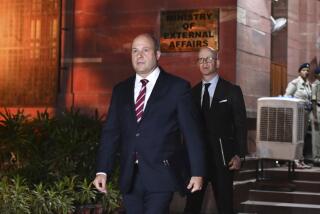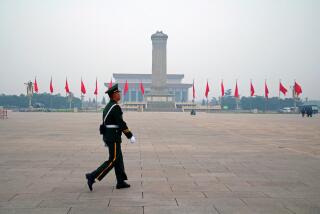Russia, Britain Each Expel Four Envoys
- Share via
LONDON — In a tit-for-tat exchange reminiscent of the Cold War, Russia and Britain each expelled four of the other’s embassy officials Friday as the apparent climax to a spy scandal that both seem eager to end.
The two governments have been negotiating since earlier this month, when security officials in Moscow linked British diplomats to a Russian national jailed for selling official secrets.
A terse statement from the British Foreign Office said the Russian ambassador was called in Friday and given “the names of four Russian Embassy staff we expect to be withdrawn within the next fortnight.”
Britain’s action, the statement said, was a direct response to a Russian move earlier in the day when Deputy Foreign Minister Sergei Krylov informed British Ambassador Andrew Wood that the British “were required to withdraw four members of the embassy staff within the next few days.”
The British statement, which did not name any of the four or clarify whether they were diplomats or embassy officials without diplomatic rank, came near the close of business Friday in London.
By then, the Foreign Ministry in Moscow had closed without comment or confirmation.
Friday’s action may in retrospect prove a compromise by two governments eager to defuse one of the most potentially explosive East-West espionage cases since the collapse of communism.
British agents in Moscow were accused on May 6 by the Federal Security Service, the main successor to the KGB, of having bought “political, defense and strategic” secrets from a government employee.
The Russian, never named, was described in the Russian press as a diplomat, “a young man . . . promising and talented in his field.”
He is charged with treason, a crime punishable by death.
The next day, Russian intelligence officials presented Wood with a list of nine British diplomats and the accusations against them, the Russian press reported.
“The talk is about career spies, not about diplomats,” Alexander Zdanovich, spokesman for the Russian intelligence agency, was quoted as telling the news agency Itar-Tass. “All of them have been completely exposed also by the evidence of the agent, who was caught red-handed.”
The nine would be expelled, security officials said initially. In a replay of an old Cold War theme, Britain denied the accusations and warned that it would retaliate in kind against Russians based here.
From the outset, the Russian Foreign Ministry soft-pedaled the incident, eager not to sour otherwise good and commercially profitable relations.
On Tuesday, Grigory Karasin, a ministry spokesman, told reporters that Russia had decided to expel some of the nine accused diplomats but would not say how many or when.
“The situation should not be dramatized and called a scandal,” Karasin said. “It is a typical action by special services ensuring the security of their country and people. It seems to us that, in the interests of maintaining good relations between Russia and Great Britain, the emotional dust should settle somewhat around this issue.”
Friday night, British sources said privately that the four-for-four expulsions were a satisfactory end to the murky episode.
Times staff writer Richard Boudreaux in Moscow contributed to this report.
More to Read
Sign up for Essential California
The most important California stories and recommendations in your inbox every morning.
You may occasionally receive promotional content from the Los Angeles Times.













